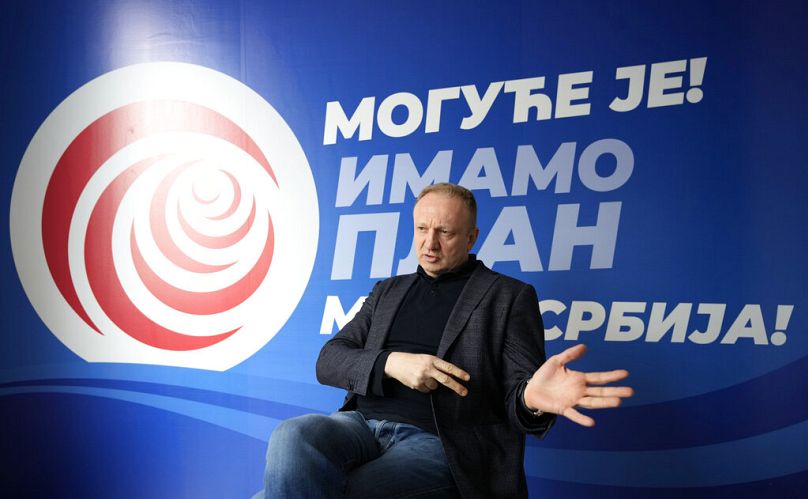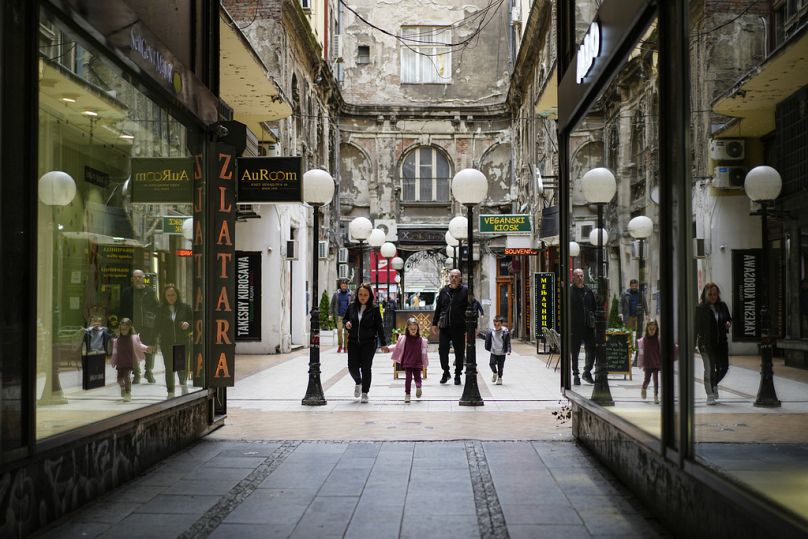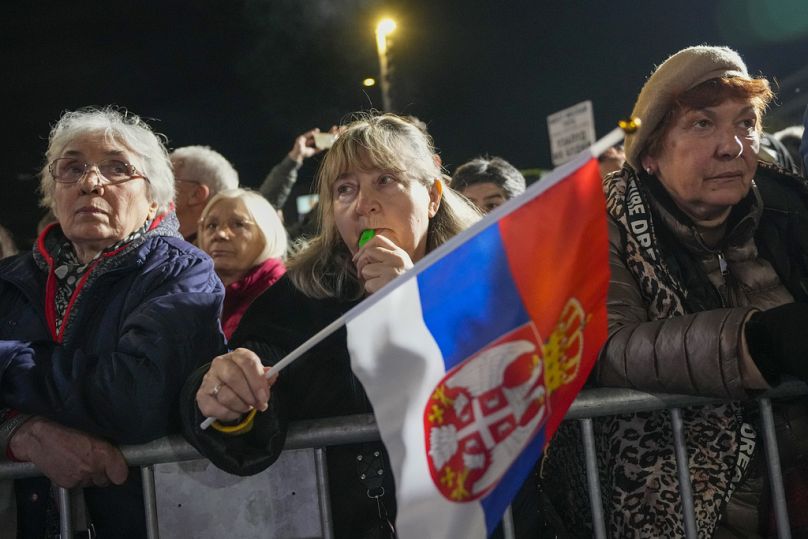The Serbian Parliament has 250 seats, and incumbent President Aleksandar Vučić will face off against his main opposition rivals from a right-wing bloc, and Belgrade Mayor Dragan Djilas.
Serbia goes to the polls on Sunday 17 December in early parliamentary elections for the People’s Assembly of Serbia and for the provincial parliament of the Autonomous Province of Vojvodina.
People in more than 60 towns and cities will also vote, since the mayors of those municipalities resigned when the parliamentary elections were called.
Who are the main contestants?
Incumbents
On one side is the ruling coalition lead by the Serbian Progressive Party (SNS) of the Serbian President Aleksandar Vučić. In the outgoing parliament this coalition, together with the supportive party of ethnic Hungarians had a comfortable majority of more than 150 deputies. The Serbian Parliament has 250 seats. This coalition has been ruling the country since 2012 when Aleksandar Vučić, having split from the nationalist Radical Party, lead the then new Progressive Party to victory. The second largest partner in the coalition is the Socialist Party of Serbia, once headed by the Serbian President Slobodan Milosevic who died in the Hague UN prison indicted for war crimes during the 90-ies wars in former Yugoslavia.
During the previous decade the Vučić Party had significant success in economic development of the country, having built modern infrastructure, reduced unemployment and attracted foreign investment. But Vučić’s ruling style, where all the power in the country is centered in his office had him often branded populist autocrat. Both the European Parliament and the European Commission have addressed serious deficiencies in the Serbian democracy in all of their annual reports on the progress of Serbia towards the EU membership. Most complaints have to do with the rule of law and the freedom of the press. Vučić is often compared with the Hungarian PM Victor Orban with whom he has a very friendly relationship. Recently Vučić received a lot of flack from the European capitals and the US for refusing to join the western sanctions against Russia and openly stating his intention to maintain good relations with Moscow while condemning its attack on Ukraine.
Opposition
The opposition side is divided into two camps. The first is so-called pro-European opposition. The largest party there is the Freedom and Justice Party lead by the former mayor of Belgrade Dragan Djilas. This block includes civic, green and center-leftist parties whose programmes have the EU membership of Serbia in their focus. Their decade-long attempts to upset Vučić produced modest results. Some analysts point out that this is due to the lack of coherent programme or counter-offer to the voters. They themselves blame their sluggish performance on the fact that Vučić controls the national media, bashes them with his tabloid press and obstructs their work. In the outgoing parliament this block had around 40 deputies.
The second opposition block is that of the right-wing nationalists. They failed to agree on the pre-election coalition so they will face the voters in two camps. Both of them have similar programmes though. Apart from typically right-wing traditionalist, pro-family, pro-life, anti-abortion and anti-gay rhetoric a lot of their agenda is focused on Kosovo (a former Serbian province which declared independence in 2008, a move that Serbia refuses to accept). They say that saving the sovereignty over the “heart of Serbia” is the first of many reasons why the Serbs should say no to the EU membership. So far the parties from this part of the spectrum had around 20 deputies in the parliament.
Why are the elections early?
Indeed, why should a country with stable majority in the parliament and no crisis of government have a snap election? And not just one, but four in a row. The previous elections were last year.
Since the SNS came to power, this will be the seventh time that Serbian citizens have been called to the polls. Only once have the deputies had the chance to finish their four-year term.
“Vučić calls new elections when it suits him, when he perceives a decline in popularity or when he assumes that situations unfavourable to his government may arise in the future. By doing so, he manages to carve out room for maneuvre that allows him to postpone important decisions, primarily those concerning Kosovo,” wrote Antonela Riha, a well-known Serbian journalist and political analyst for Osservatorio Balcani e Caucaso Transeuropa.
In the past, the opposition protested such elections, even boycotted them. This time around they demanded them albeit only for the Serbian and Belgrade parliaments.
“I solved neither side of this equation. I do not understand why the opposition demanded the elections, it’s a mystery to me. An even bigger mystery is why Vučić intended to have them anyhow. There is no crisis of the legitimacy of government which demands snap elections. You don’t have hundreds of thousands of people in the streets. When the people did take to the streets the leaders of the opposition addressing them shouted at Vučić: “Don’t you dare call the elections!”, says Ljilja Smajlovic, a journalist and political analyst.
What is at stake? Parliamentary electioned turned presidential
The opposition demanded the parliamentary elections be held separately from the Belgrade and Vojvodina ones and that Vučić does not lend his name to the campaigns he is not a candidate in. Vučić refused them flatly declaring the elections a confidence vote for him personally.
“If they (the opposition) win the elections I will give them the mandate but I shall no longer be the President because I would no longer be able to do anything for the citizens of Serbia. I want the people to know that…. I want the people to know that when they vote, they do not only vote for the list of deputies, they also vote for their president, they vote for me or against me, just like they (the opposition) say,” said Vučić on the campaign’s starting rally.
Is it all about Belgrade?
Opinion polls suggest that the ratings of the ruling parties are not in sharp decline in comparison to the previous elections. If the SNS can maintain the same or similar coalition they have now, they should not have a problem forming the next government.
But the capital city is the traditional stronghold of civic, liberal parties, currently in opposition. In previous Belgrade elections the SNS struggled to form the city government and managed only after repeated voting and after some opposition deputies defected to them. This is the closest race again and the important one. Belgrade is home to one quarter of the Serbian population and produces more than half of the country’s GDP. It is where the money is and winning Belgrade is generally seen as the prelude
to assuming power in the whole of the country. Pro-EU opposition is the strongest one but the nationalist one, along with the Socialists could still be the king-makers.
What is on offer for voters?
Throughout the campaign the ruling SNS party has been trying to capitalize on the economic achievements. Hundreds of miles of new, modern highways, high-speed trains, refurbished schools and hospitals and constant influx of foreign investment.
“As of the beginning of October, we have 3.42 billion euro worth of new foreign direct investment this year. Last year was a record one, with 4.4 billion but I hope we will surpass that by the end of the year,” said Vučić on a rally inaugurating a new road in the northern Serbian province of Vojvodina.
Unemployment rate of 9.1% (projected by the IMF) is lower than in some EU member states and the economy growth was steady throughout the COVID pandemic and the war in Ukraine (this year projected at 2.5% by the Government). The government also boasts record hard currency and gold reserves as well as a small budget deficit of 3%. The only data that spoils the picture, especially because it makes life hard for the people, is the second highest inflation in Europe (Turkey excluded) of over 10% as of November.
The opposition focuses on the rule of law, media freedom and corruption, all three being the constant point of criticism in several successive reports on the progress of Serbia towards the EU membership by the European Commission and European Parliament issued so far.
"The new technical government should set aside differences, arrest all the crimnals, you see that crime is rampant. Policemen who fight and arrest the drug dealers will lead the police, not the ones who prevent them from doing so. Everyone’s property will be examined as well as business deals and tenders. And we will free the media,“ promised Djilas (in a Euronews Serbia programme).
What was the campaign like?
With the elections having been turned into a no-confidence vote on Vučić’s rule, the lengthy 45-day campaign soon turned into trading insults and accusations. The opposition used their media to accuse Vučić of organizing crime and corruption and he fired back salvos from the media he controls, notably the high-circulation tabloids to portray opposition leaders as enemies of the people.
After a visit to Serbia, Council of Europe observers underlined that the election campaign is characterised by “an unprecedented level of negative language, scaremongering, attacks on the opposition and journalists and serious problems affecting the media”.
However, the physical fights between party activists and poster wars that happened in the past, were not reported so far.
With the opinion polls showing that most of the older voters are already decided and unlikely to change their minds, the politicians engaged younger ones including the first time voters. Vučić announced that high-school children would be given a 10.000 dinars (€90) of financial aid each and students’ newly established benefit cards topped up with 1.000 (€9). The opposition accused him of bribing the voters with the money from the budget. Vučić, along with some of his ministers, also opened a Tic Toc account where he performs memes.
With the opposition crying foul because of the electoral conditions the monitoring of elections will be crucial to eliminate the possibility of irregularities or claims of thereof. Observation promises to be abundant. All the participating parties are allowed to send observers to all the polling places. As usual OSCE, Council of Europe and the EU missions will observe the vote as will some of the Serbian NGOs.














